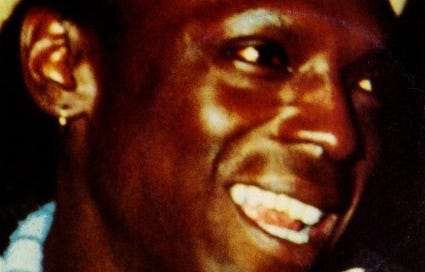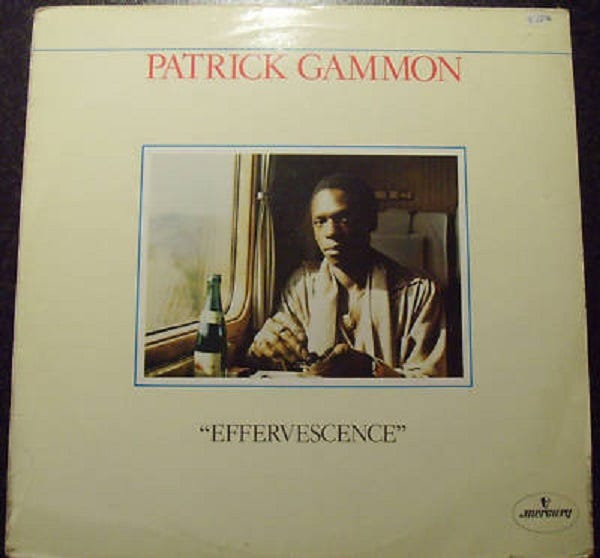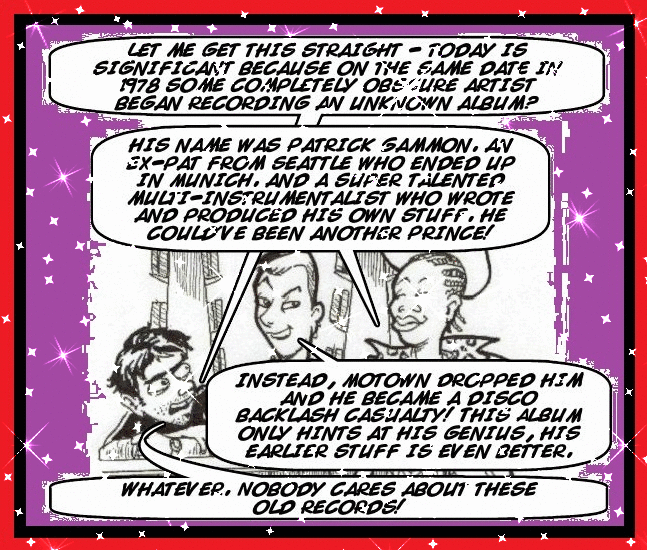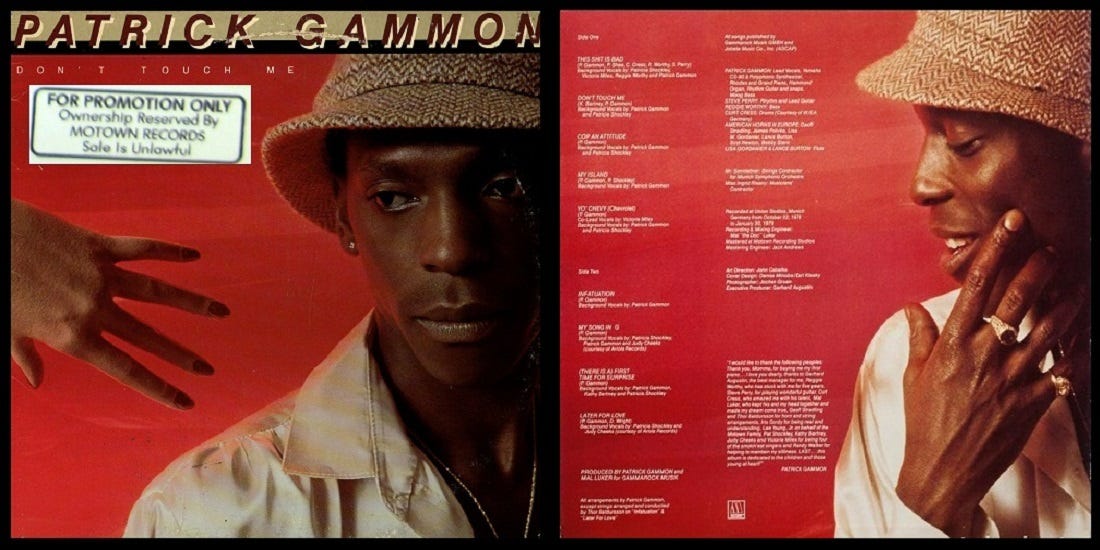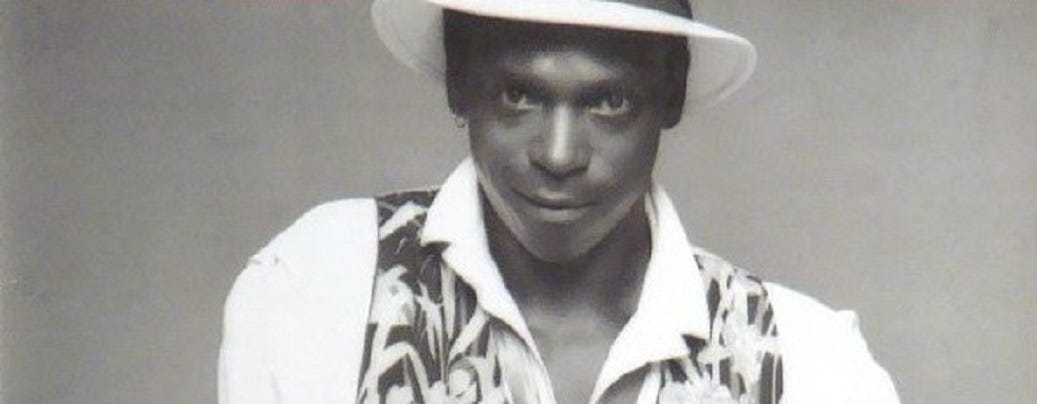Patrick Gammon (January 15, 1956 – October 28, 1996) – Elephant's Matin' (1978)
The talented unsung keyboardist who played with Ike & Tina Turner wrote this funky synthesizer masterpiece that channeled Billy Preston and Stevie Wonder.
View most updated version of this post on Substack.
Patrick Gammon was an extremely talented singer/songwriter, musician, and producer who played keyboards with Ike and Tina Turner in the mid-seventies. He then moved to Munich, Germany where he had a solo career and released several albums’ worth of great music but never achieved the international stardom he deserved.
Patrick Neal Gammon was born and raised in Seattle, Washington. He taught himself to play piano at a very young age. “I knew something was wrong with me at five years old, when I sat down at my first piano, Gammon recalled years later. “I said, oops, this is something I'm going to have to do for a long time, because I was playing already at five.” Later he played the trumpet for seven years, starting in elementary school.
He came from a musical family, with his mother singing in church and his older brother jamming regularly with his high school classmate Jimi Hendrix:
“When they were like fourteen, fifteen, they played all this old loud ass rock music. My brother would take me to their rehearsals and I hated that music because it was all loud. My brother played guitar and Jimi played guitar, and it was just loud.”
While he was still playing trumpet, Gammon got a scholarship to the all-city band in Seattle. But his single mother couldn’t afford to buy him his own trumpet. She was working as a domestic maid, and he would go with her sometimes:
“We’d always go to these rich areas in Seattle where these white people (had) mansions with grand pianos and everything, and when my mom was cleaning up, I’d go in and sit down at the piano and start fiddling around. And that’s really when I started getting interested in the piano. My mother noticed that. So when I was ten or eleven, she somehow started working two jobs and she bought me an acoustic piano. I came home one day, and there was this big piano in the apartment with (a) big ribbon around it.”
Gammon played keyboards with a Seattle-area R&B group called Family Affair in 1973, when he was 16. Next he auditioned to become the keyboardist for Ike & Tina Turner’s backing band, the Kings of Rhythm. He got the gig and played with them for two years from 1974-76.
On July 1, 1976 in Dallas, Texas, shortly before a planned show at the Dallas Statler Hilton, Ike & Tina’s musical partnership abruptly ended when Tina fled from Ike with only the clothes on her back and 36 cents plus a Mobil gas card in her pockets. She filed for divorce later that month, fed up with years of his domestic abuse which had only gotten worse as he became addicted to cocaine.
The duo’s manager at the time was Gerhard Augustin, the German co-founder of the TV show Beat-Club and former A&R head for United Artists in Munich who got his start working for the label in Los Angeles. Convinced of Gammon’s talent, Augustin formed a new company with him, Gammarock Musik. He produced his debut single “Party Hardy,” which was released in 1976 on the UK label Galaxy Records. Its B-side was a remixed Disco Version that showcased Gammon’s keyboard mastery, channeling the sounds of Billy Preston and Stevie Wonder.
Before the Disco Version was added as its B-side, initial promo copies of the single included another of Gammon’s early songs, the superb mellow jam “Driving (down Pacific Coast Highway).”
In 1978, Gammon’s debut solo LP was released. It was issued on Gammarock Records in Germany and titled Rawness, but re-titled Effervescence in France where it was licensed to Mercury Records.
The album’s highlight was arguably the instrumental synthesizer masterpiece “Elephant’s Matin’.”
Gammon’s vocals on the LP’s stellar disco-funk opening cut “(Fly Me High) Dancing Shoes” simultaneously resembled Rick James and Sylvester, and the track itself had the electronic, futuristic feel of the Munich disco sound made famous by Giorgio Moroder.
“(Fly Me High) Dancing Shoes” was co-written and produced by the German producer Olaf Kübler, with lyrics by Gammon.
Gammon next entered into a deal with the German record label Metronome, and he and Augustin used the advance to record a demo for Motown. Berry Gordy had never signed an artist based in Germany before, but Motown recognized Gammon’s potential and put him under contract.
On October 22, 1978, Gammon and his band entered Union Studios in Munich to begin recording Don’t Touch Me, his first and only album for Motown.
Sessions lasted off and on until January 20, 1979, and the LP came out later that year. Billboard gave it a positive review in its June 16, 1979 issue:
“Foreign made product (this was waxed in Germany) is unusual for Motown, but the company hits home with Gammon, whose gritty baritone and delivery recalls the excitement of Rick James, and the vocal texture of Lionel Richie. Most of the material is upbeat or midtempo, with solid percussion, layered synthesizers and brass flecked rhythms. Strong femme backup is evident, too.”
It was packed with funky cuts like the midtempo jam “My Island,” the laid back love song “Infatuation,” and its highlight, the sexy funk bomb “Yo’ Chevy.”
The album did not sell well, and by the end of the year, Motown cut Gammon loose from his contract. Like so many disco, funk and soul artists whose careers were just taking off in the late 70s, he became a casualty of the racist, homophobia anti-disco backlash that gathered steam after the infamous Disco Demolition Night in the summer of 1979.
Years later, in a lengthy interview taped shortly before his death, Gammon explained the pressure he faced during this period to conform to what his labels thought would sell:
“Then the record company said, Oh maybe your music is too Black, so then I said, "Okay, I'll change a little bit. I won't be so...when I compose, I'll try to do more melodies like ABBA or something more straighter and everything. Then when I went back in the studio, they told me my music wasn't Black enough. So it was a dilemma and I was in this vacuum, I didn't know what to do. The only release for me was to go and play live."”
Undeterred, Gammon kept making music in Germany. He released two live albums on Gammarock Records, Live At The Bavaria (1981) which contained an excellent version of his autobiographical “White Boy,” and Spin The Jam (1983), the latter a double album that featured unsung disco icon Alma Faye Brooks on guest vocals.
In 1983, he formed the duo Patto with German singer Thomas Fuchsberger, and together they co-wrote and co-produced the humorous but lyrically serious anti-racist anthem “Black And White” (1984). As one YouTube commenter recently noted in jest, “If this song was released today it would end racism by the end of the week.” But it showed Gammon’s social conscience and was a #6 hit for them in Germany and #2 in Switzerland, becoming his most commercially successful single.
He released another three solo albums on Teldec Records, starting with the soundtrack to the film Kaltes Fieber (Cold Fever) (1984), which he almost entirely composed, arranged, and played all the instruments on. After the lengthy vocal buildup faded out on its title track, it became a spaced out, futuristic synthesizer dub masterpiece. The film won the 1984 German film prize for Best Music.
Live Music (1985) followed, with Gammon rapping on both the pop single “Do My Ditty,” and the electro-tinged “T.O.P.” He starred in a campy, racy promotional video for the LP’s infectious jam “Help Me!” that qualifies as a forgotten 80s classic. Emerge (1986) came next, featuring “Tuff Luck,” which he wrote and had been previously released as the harder-edged “Tough Luck” (1985), the B-side to “Help Me!”
Sadly, Gammon’s life and career ended in tragedy. He became addicted to drugs in the mid-eighties. According to one source:
“Patrick suffered a serious accident in 1986 while intoxicated with drugs, as a result of which his hands were paralyzed and from then on he operated the piano keys with his knuckles (!) He later fell ill with AIDS before finally passing away from lung cancer in 1996.”
Rest in Peace, Patrick Gammon.
Further info:
“Patrick Gammon Biography + Interview,” by Gammarock Visual, YouTube, December 16, 2020.
“Gerhard Augustin Interview: The Godfather of Deutsch Rock,” by Archie Patterson, Eurock.com.
#soul #funk #disco #Motown #PatrickGammon


